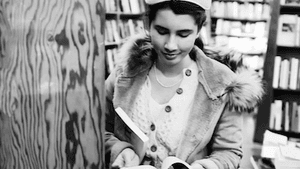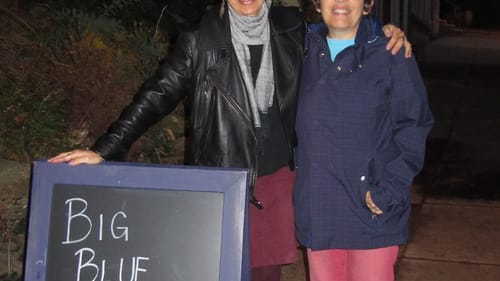Stay in the Loop
BSR publishes on a weekly schedule, with an email newsletter every Wednesday and Thursday morning. There’s no paywall, and subscribing is always free.
The shelves that saved our lives
In honor of women's bookstores

When my friend Pattie came out as a lesbian a half-century ago, her Midwestern mom followed a predictable script: disbelief, confusion, abject silence, anguished tears. After one taut visit, her mother leaned into the car as Pattie was leaving and hissed, “It’s those bookstores!”
Years later, when Pattie told me that story, we laughed so hard over her mother’s desperate attempt to shelve blame that we spilled our coffee. And then, after we wiped our eyes and paid the café bill, I trotted a few doors up Broadway for my volunteer shift at A Woman’s Place bookstore.
Finding a place
I’d never even heard of women’s bookstores before I moved to Portland, Oregon in 1986. Then again, I’d never hot tubbed with naked strangers, worn Birkenstocks, nor eaten a tempeh Reuben. Clearly, I was not in Kansas (or Philadelphia) anymore.
Was it obvious to all the lesbians I met — and I seemed to keep meeting them, at work, at cafés, on the dance floor — that I’d fallen in love with a woman and wasn’t quite sure what to do next?
Someone must have nudged me toward A Woman’s Place. The store smelled of sage; in addition to books, we sold labrys pendants, smudge sticks for cleansing bad spirits from a room, and bumper stickers with mottos like “My other car is a broom.”
During slow stretches, I embarked on a self-guided syllabus, an extension of the sole women’s studies course I’d had in college: Shulamith Firestone; Mary Daly; Adrienne Rich; Nice Jewish Girls: A Lesbian Anthology.
After a few months of Saturday shifts, I grew bold enough to ask questions of the store’s longtime staff. “How did you know you were a lesbian? Did you ever date men? How did your family react?” And I kept reading, starved for community and courage: If these authors could risk being themselves, could even write frankly about their relationships with women, what was holding me back?
When I came out to my parents a few months later, I brought them — of course — a stack of helpful books, all recommended by our staff.
Among the stacks
Pattie’s mother really wasn’t so off base. Before Ellen’s coming-out episode, before the New York Times published announcements of lesbian and gay commitment ceremonies, before the internet let closeted kids in rural America know they weren’t sick or crazy, some of us (the lucky ones) had stores. Bright, crammed spaces in Chicago, Berkeley, Bridgeport, and Portland, where a befuddled Q (for Questioning) on the LGBTQ spectrum could go to tank up on queer history, find eloquent role models and even (thanks to sexuality educator JoAnn Loulan’s “pink book”) learn what lesbians actually did in bed.
It was at that store where I sought solace after my tearful coming-out weekend in Philadelphia. There, while helping customers, I learned to say “lesbian” out loud.
And it was that store that led me to my life partner. I thumbtacked an index card to the community bulletin board (remember those?) noting that I wanted a writing companion to meet regularly for encouragement and critique. Elissa showed up in her leather jacket, notebook tucked under one arm. I fell in love before she even turned a page.
It gets better
It got better — being a lesbian did, that is. Not so much for independent booksellers. There were years when it seemed the behemoth stores would eat all the little ones for lunch, years when Amazon’s vast inventory upended the whole business. A Woman’s Place closed. So did The Book Garden in Denver and Mama Bears in Oakland.

But then something unexpected happened. Here and there, independent bookstores poked back up or managed to hang on. Big Blue Marble came to my Mt. Airy neighborhood in 2005. Novelist Ann Patchett opened Parnassus Books in Nashville in 2011. Chicago’s Women and Children First survived a 2014 change in ownership, and Austin’s BookWoman will soon mark 40 years of business.
These days, I don’t need a store to give my life queer context. But I need it for other reasons: I can ask a staffer what my precocious 12-year-old cousin might enjoy, and her recommendation will be spot on. I can stand there for an hour, if I like, and thumb through the painful, essential words of Ta-Nehisi Coates. I can pop in pretty much any time and know I’m likely to see a familiar face.
And, since election day, I can show up on Friday afternoons for a shot of tenacity and resistance: staff and customers penning letters to the CIA, phoning members of Congress, or jotting down titles to help sustain us during these terrifying times.
The place smells of spice tea. The children’s section has books for kids with transgender parents. There are CDs, stickers, and a whole shelf of Phillycentric titles. Two flights up, someone leads a poetry workshop. Maybe the shopper who just walked in — the girl with the hood bunched around her face, or the 20-something with the skinny necktie and gender-fluid haircut, or that older butch with grandchild in tow — will find the thing bookstores have always offered, something both consoling and transgressive, words they didn’t even know they were missing.
What, When, Where
Big Blue Marble bookstore, 551 Carpenter Lane, Philadelphia. 215-8441870 or bigbluemarblebooks.com. See website for events.
Sign up for our newsletter
All of the week's new articles, all in one place. Sign up for the free weekly BSR newsletters, and don't miss a conversation.

 Anndee Hochman
Anndee Hochman